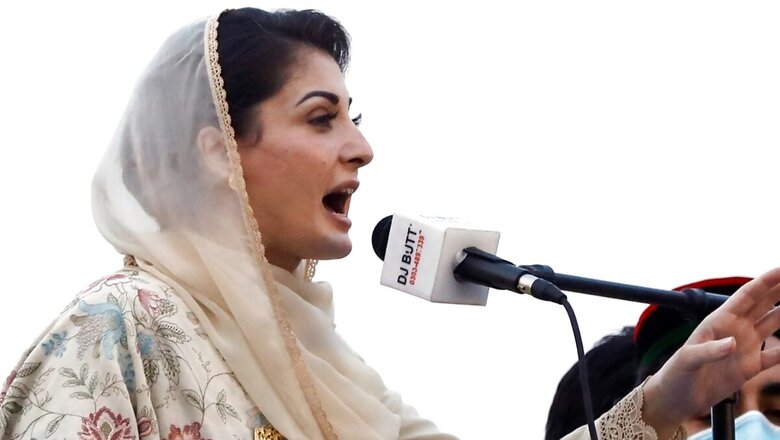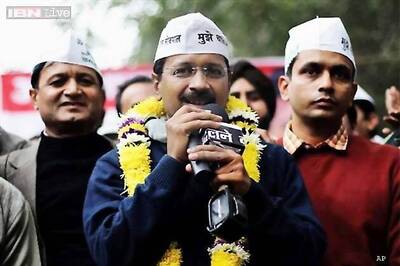
views
Shortly after Maryam Nawaz became the first woman chief minister of Punjab province on Monday, Pakistan’s social media was flooded with posts — many of them in poor taste — slamming the senior Pakistan Muslim League-Nawaz (PML-N) leader, considered the political heir of three-time PM Nawaz Sharif.
Questions were raised: did she get the post by virtue of being the daughter of Nawaz Sharif, or did she earn her position when elected to head Pakistan’s most populous region? Maryam assumed the chief ministerial post amid a boycott by lawmakers of Sunni Ittehad Council (SIC), backed by former prime minister Imran Khan’s party PTI.
In her maiden speech at the provincial legislature, Maryam said that she was happy to sit in the seat where her father used to sit. “My father trained me how to run the office,” the 50-year-old leader said in the provincial assembly. “Today, every woman of the province is proud to see a woman chief minister,” she said and hoped that the tradition of female leadership would continue in the future as well.
She faced a barrage of criticism by Imran Khan’s Pakistan Tehreek-e-Insaf (PTI), which say that their candidate of PP159 won against Maryam in the election marred with rigging allegations. No wonder PTI’s supporters, who are visibly active on social media and say the entire election was stolen from them, have launched an online tirade against Maryam — though there remain those on the other side of the spectrum who hail her appointment as a “progressive move”.
When asked to comment on Maryam, Imran Khan’s sister Aleema said, “She is not capable of this (chief ministership of Punjab?). That something should be said. I pity her. She was forced to sit on a chair.” In a video posted on X, PTI-leaning journalist Imran Riaz Khan described Maryam as a “mandate thief”. He said even if Nawaz Sharif and his family formed a government, the people of Pakistan would not accept that.
The woman who stole Punjab's mandate & became CM by force is continuously acting like she is in a bollywood movie.Someone cancel her subscription of Indian channels please…!!!#MaryamNawazpic.twitter.com/GobMyrdmpL
— Huda Naveed (@Huda_Nav) February 26, 2024
You all chanting women empowerment wont change the fact that #MaryamNawaz stole the mandate of 130 million people and its an insult to even put her next to our hard working women of Pakistan. Not a moment of pride but SHAME! https://t.co/ynAW5fxJIP— MJ (@KhanMahein) February 26, 2024
This father can do anything for his daughter even if it means sending his countrymen to jail or joining hands with his old enemies. Such a lovely bond ???? #MaryamNawaz pic.twitter.com/Sjf3zCaYou— Cric Basheer (@basheer_699) February 26, 2024
In a political commentary published in GEO News, Pakistani columnist Mehmal Sarfra answered the questions raised on Maryam’s credentials to lead Pakistan’s most populous region. “One answer would be that this may well be true that her rise as CM of Punjab is because of who she is. But it is also true that the hate she gets online and offline from both men and women is not just because she is Nawaz Sharif’s daughter. It seems that she gets this ‘hate’ because she is a woman and an aggressive one at that,” Sarfra wrote.
She asked why is it that Maryam is mentioned in the vilest of ways. “When we look at male politicians who have even worse language skills, with worse manners, and who have made it their brand that they have no respect for male and female political rivals alike, why is it that Maryam gets more flak, and they don’t?” “Maybe it has to do with our society’s mindset where men are appreciated for these attributes while women are demeaned and humiliated for lesser things…As a society, we want women to breakdown but we don’t expect to see them stand up to bullies. A courageous woman invites hatred in many forms. An opinionated woman invites hatred. An independent woman invites hatred,” she said.
Writing in the Dawn newspaper, columnist Rafia Zakaria found a link between a successful Pakistani woman and her family’s stature. She argued that the high achievements of a woman in the country simply meant that her family of men was usually powerful enough to allow her to break the gender barrier. “In Pakistan, if you have a certain surname, you can overcome the fact that you are a woman…They allow your achievement to carry the added glamour of being the ‘first’ woman in addition to the cushion provided by their family. Add a few promises geared to improving the condition of women and their job is done,” argued Rafia, an attorney teaching constitutional law and political philosophy.



















Comments
0 comment